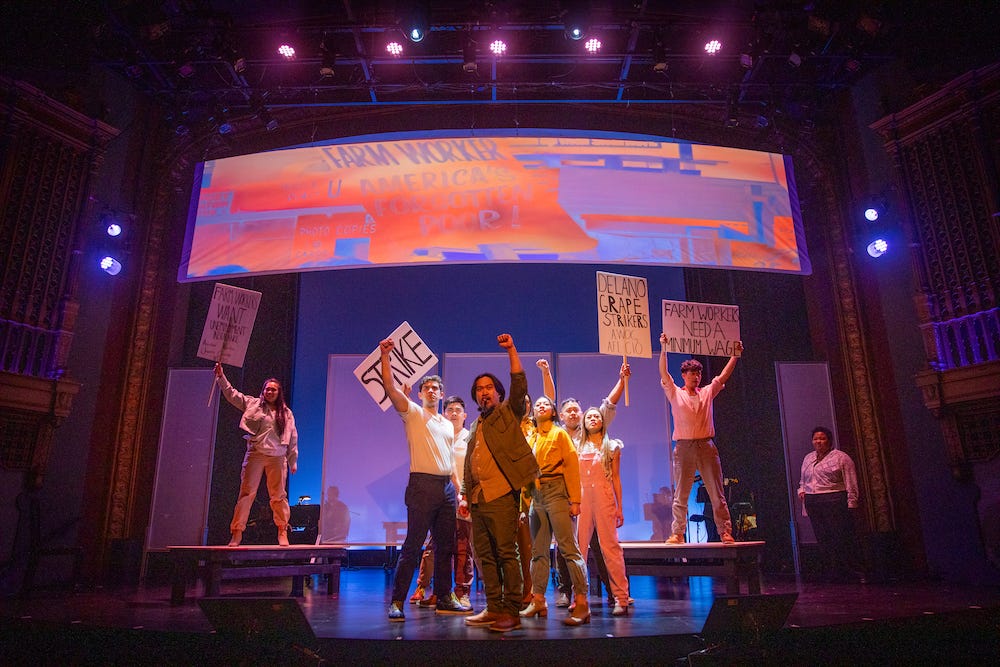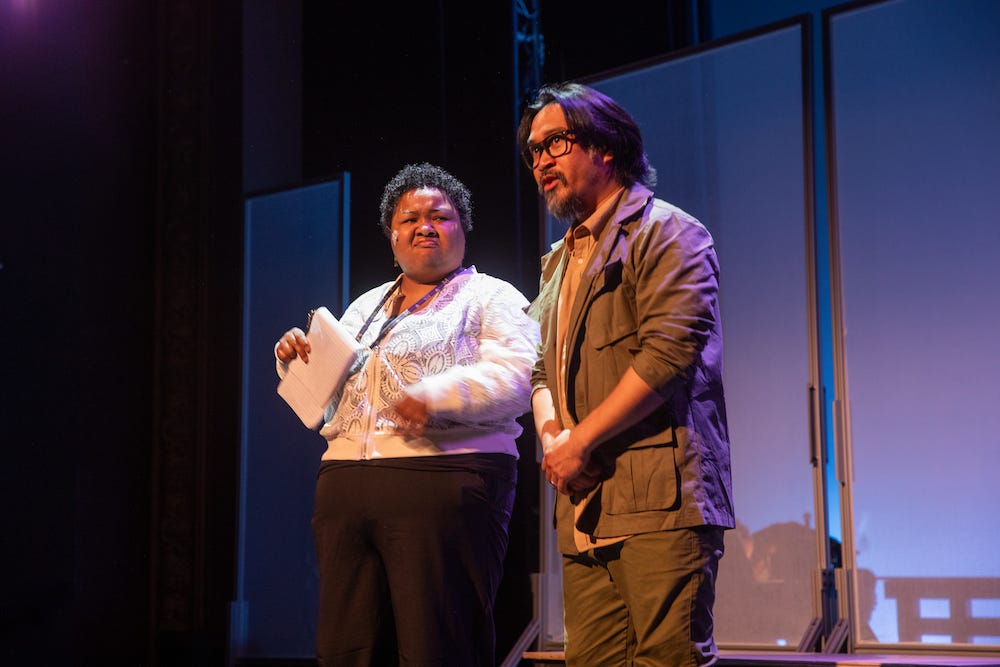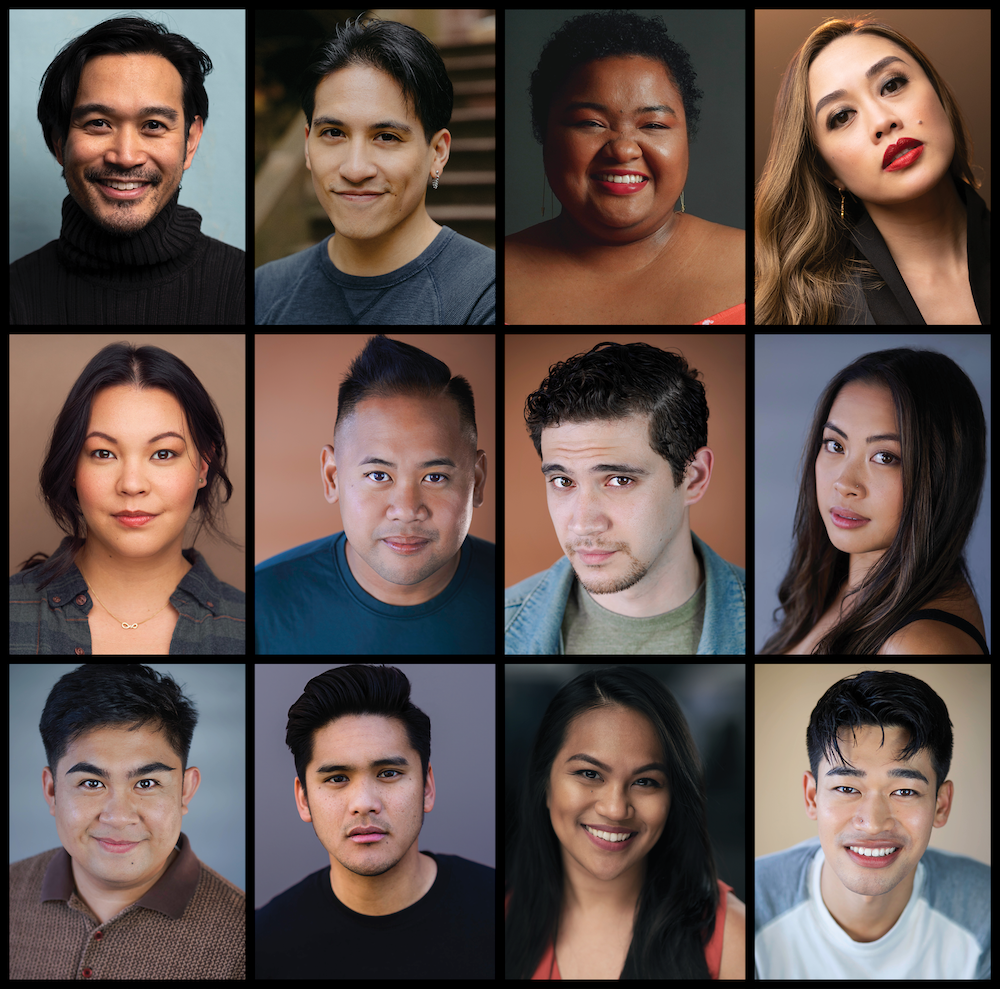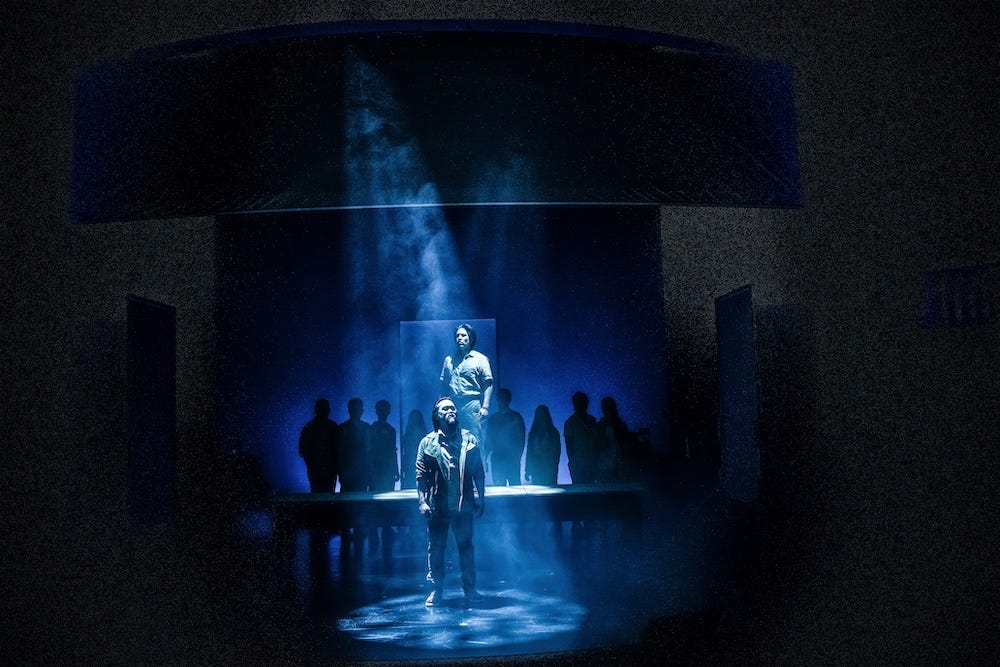“Larry the Musical” tells story of overlooked Filipino American labor leader
“We've been silenced for 50-plus years about Larry, and to feel our audience saying, ‘Yes, we need to tell this story,’ that we're here together and can uplift this story is everything."
It was a surprise for Gayle Romasanta when more than 300 people stood to their feet as they erupted with applause at the end of the first preview of “Larry the Musical.”
After five years of work on the production, it was the first time it was performed for a full house at the main stage of the Brava Theater in San Francisco.
“Larry the Musical” tells the story of Filipino American labor leader Larry Itliong, whose significant role in the labor and farmworker movement has been largely overlooked in previous decades. Cesar Chavez has been most often associated with the farmworker movement and Delano Grape Strikes. But it was Itliong who led a walkout on Sept. 8, 1965 that marked the beginning of the five-year Delano Grape Strikes when farmworkers demanded better wages.
“We've been silenced for 50-plus years about Larry and our involvement [in the farmworker movement], and to feel our audience saying, ‘Yes, we need to tell this story,’ I'm so happy,” said Romasanta, writer and executive producer of the musical. “That we're here together and can uplift this story is everything.”
Work on the production began five years ago, shortly after the 2018 publication of the first book about Itliong, “Journey for Justice: The Life of Larry Itliong,” which Romasanta cowrote with late Filipino American historian and scholar Dawn Mabalon. The book provided some of the framework for the musical, Romasanta said.
Throughout the last five years, the team behind the musical spent time gathering feedback through workshops to shape the final version that was performed on its opening night on Saturday. Dialogue, scenes, the storyline and music have seen multiple revisions, including the addition of what happens between Itliong and a love interest.
But there have been other significant changes as well.
Bryan Pangilinan, composer and executive producer of the musical, said he and Romasanta established an LLC for the production in the last few years, which allowed them to bring union cast and crew on board.
“We’re so proud to say that we have a union production, which is amazing because it is a union story,” Pangilinan said.
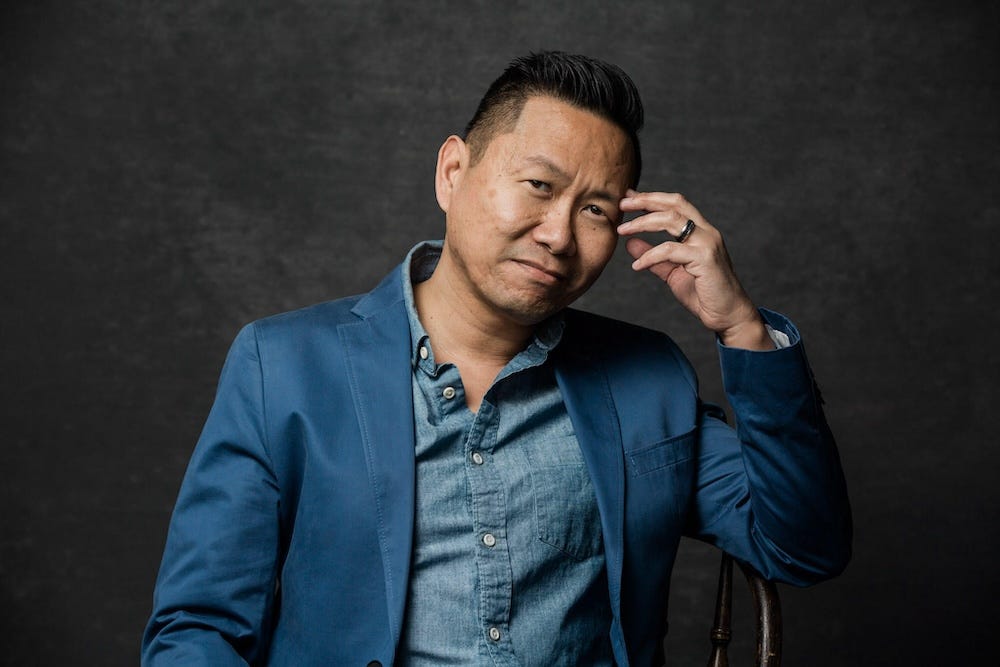
Mabalon was also written into the musical as a character, a task that Romasanta described as emotionally tough and one that had to be done with nuance.
“In my world, I can't talk about Larry without talking about Dawn,” said Romasanta, who was friends with Mabalon.
Part of the reason Mabalon was included in the musical was because it was important to Romasanta to have a woman’s perspective in the narration of Larry’s story. She added that this is why women have a central role and voice in the production.
“This is probably the first time that this portrayal of the manong generation, specifically with women at the center, has ever been done. And so I'm really proud of the fact that a woman wrote this, that two women (Romasanta and Mabalon) researched this,” she said.
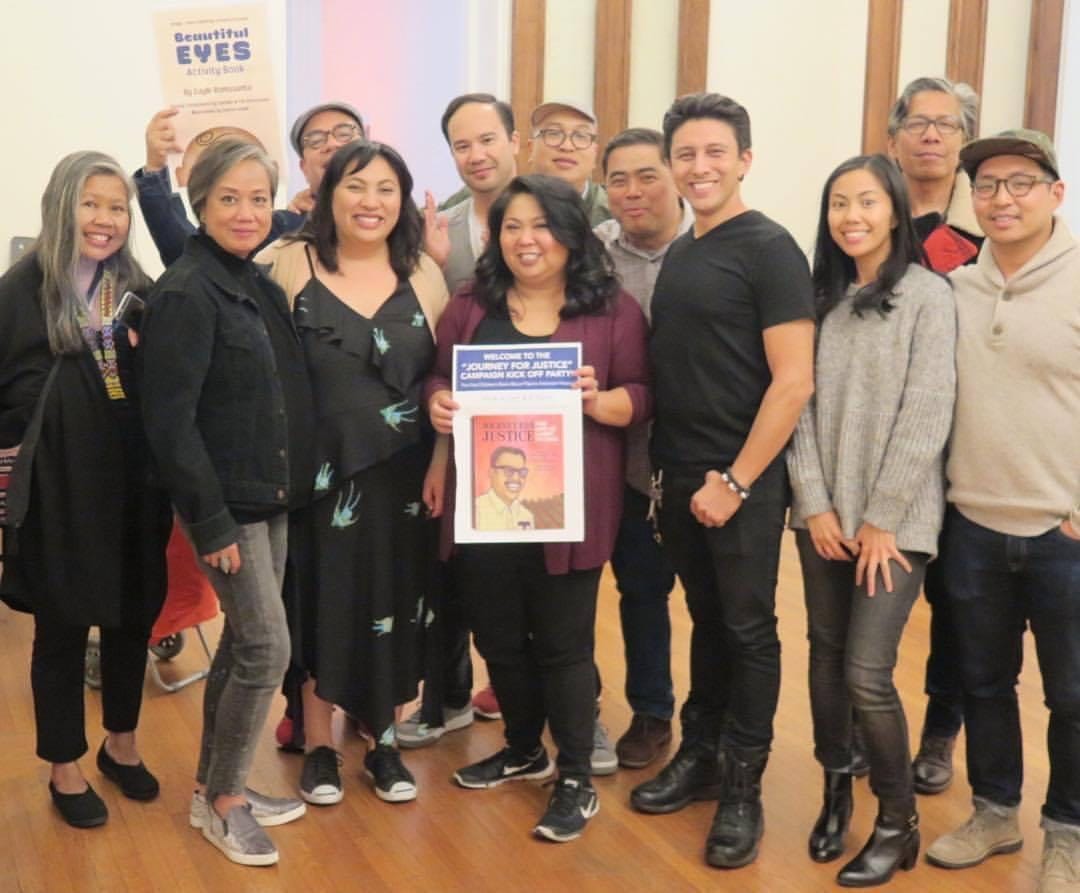
Joshua Carandang, who portrays the younger Larry Itliong and appears in more than half of the show, said he didn’t know about Itliong prior to landing the role.
“That's part of why we’re all here,” he said. “We want to get word out about Larry as a person and who he was because he’s worth that.”
Much less is known about Itliong’s life prior to his years of organizing and striking, so writers had to make inferences based on what they did know, such as Itliong arriving in the United States at around 15 years old.
“We have to imagine him as somebody who is incredibly determined and driven from a really, really young age,” Carandang said. “He picked up everything and left everything behind.”
He added that did extensive research on the labor leader to prepare for the role, but also had to remain adaptable to line changes, which were made regularly after rehearsals and based on feedback during preview performances.
Jocelyn Thompson-Jordan, who plays Mabalon, said portraying the role is a responsibility she takes seriously to honor everyone who knew her. Part of how she prepared for the role involved talking to people who knew Mabalon, including her husband and Romasanta.
“I hope they know there’s not a day I don’t think about the amazing opportunity I get to portray her; that I’m always thinking about continuing the fight that she helped start in getting us recognized,” she said.
Similarly to Carandang, Thompson-Jordan didn’t know about Itliong or Mabalon prior to “Larry the Musical.” She said that learning about her through conversations with people who knew her helped her feel more connected to Mabalon in a spiritual way.
“I pray before [the shows] because I want to make sure I am doing it with the ancestors, not necessarily for the ancestors,” she said. “So I always kind of put on a backpack and have them with me.”
For the cast and crew involved in the production, being part of “Larry the Musical” — an all-Filipino American production — has been memorable and meaningful.
Rehearsals began earlier this year and took place five days a week from 6:30 to 10:30 p.m., Carandang said. He also noted that virtually all the cast and crew involved have day jobs. Despite long days, everyone involved developed a strong bond: cast and crew members frequently brought food to rehearsals so everyone was constantly eating together. They also made it a priority to organize group outings.
“We're not just playing a community, we are a community. And I think that's so beautiful,” Carandang said. “It's not just us cosplaying being Filipino, this is the heart of the Filipino onstage.”
Pangilinan, who wrote more than 30 songs for “Larry the Musical” — around 20 of which are in the final version — said one of the unique aspects of the production is that it is by Filipino Americans who are writing about their ancestors.
“I personally have felt Dawn Mabalon through me when I’ve written some of the songs,” he said. “They’ve flowed so much. It’s something I’ve never experienced before as a composer,” he said.
The musical, he added, is a big deal.
“It’s about time. Filipinos have been in musical theater for so many years. Decades. We played the roles, but we never played Filipinos. This is the first time, really, in a show that's created by Filipinos. So I just feel so much joy and so much honor to do this,” Pangilinan said.
Romasanta said she hopes as many Filipino Americans as possible will see “Larry the Musical” and that audiences — particularly those who don’t know about Itliong — will find healing in it.
“The magnitude of silence [about Larry] is far reaching and has been institutionalized,” Romasanta said. “We have to heal from that because that's really traumatizing on our bodies to know that there was so much anti-Asian sentiment that we were absolutely erased from an integral part of California history. I mean, really, an economic huge, huge story for the United States and globally for farmworkers.”
“Larry the Musical” runs at the Brava Theater in San Francisco through April 14.




